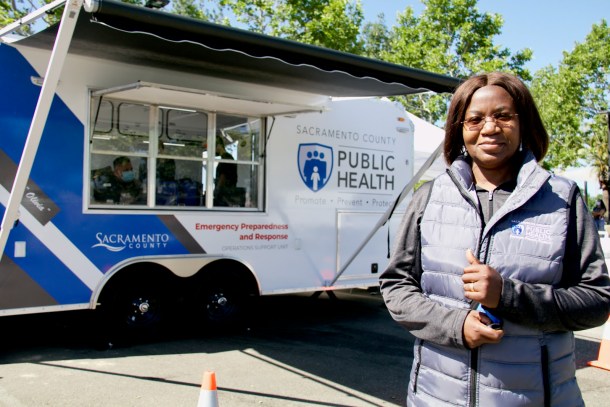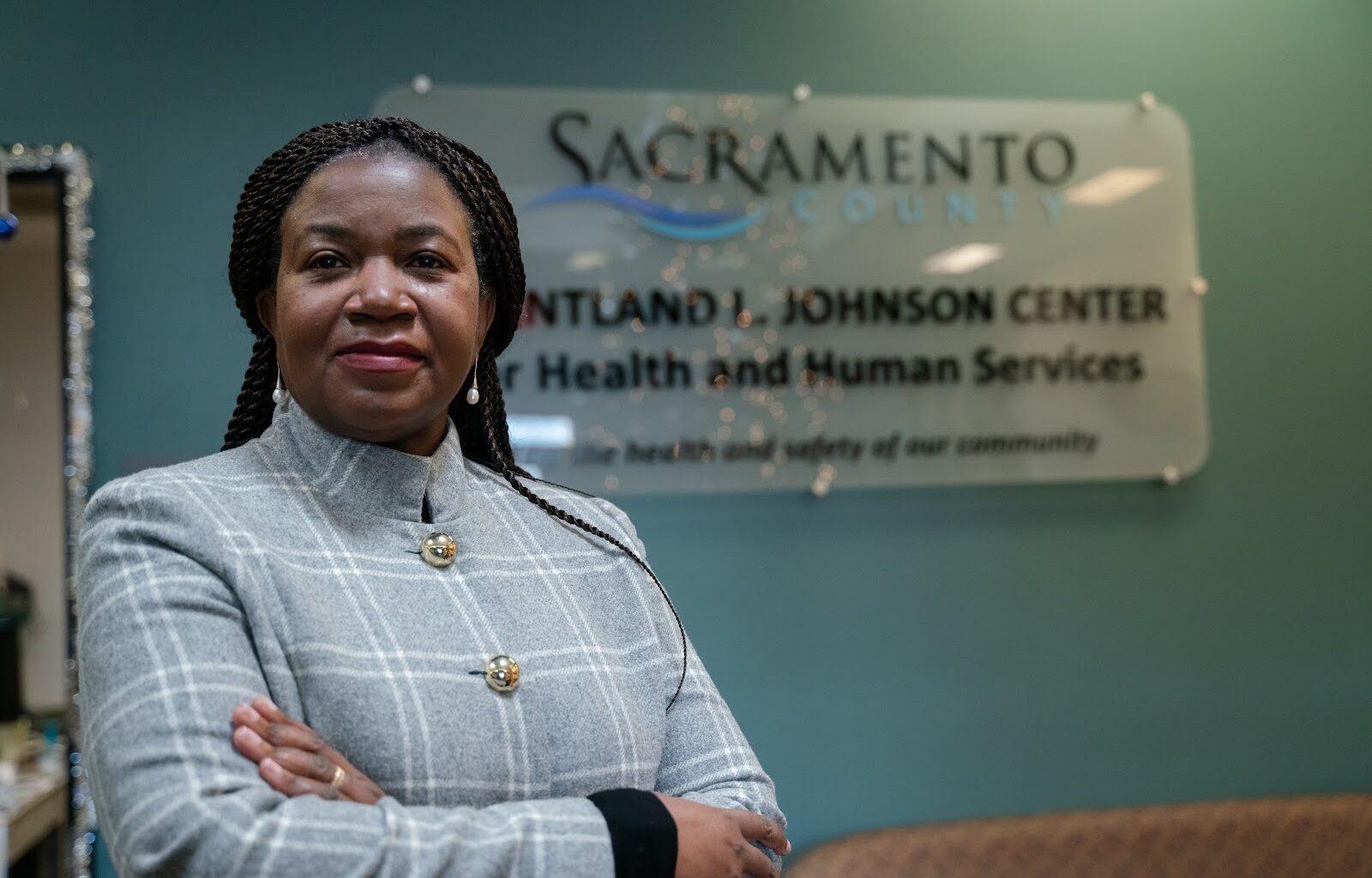During the coronavirus pandemic, terms like “essential” and “trusted community messenger” reflected the critical roles individuals and reliable information played.
In her role as Sacramento County’s public health officer, Dr. Olivia Kasirye embodied both.
After more than a decade, Dr. Kasirye, 62, has announced she’ll retire in March, the sixth anniversary of the unprecedented COVID pandemic shutdown she helped guide the county through.
“I feel that I have done everything that I wanted to do and I’m ready to move on,” Dr. Kasirye told The OBSERVER in an interview reflecting on the job, leading during challenging times and the future of public health.
Dr. Kasirye began her Sacramento County career in 2004 as a senior physician manager. She then served as El Dorado County’s health officer from 2009 to 2012 before returning to Sacramento to lead Sacramento County Public Health.
Upon taking the helm, Dr. Kasirye, who was mentored by former public health officer Dr. Glennah Trochet, set priorities that included strengthening disease response, reducing health disparities, confronting the opioid epidemic, building a resilient workforce, and achieving public health accreditation.
The county obtained that accreditation in November 2024, and, under Dr. Kasirye’s direction, Sacramento County Public Health built new equity and nursing units, expanded partnerships to improve birth outcomes and launched campaigns to prevent opioid overdoses among youth.
Times are as challenging now as they were when she started in 2012.
“It was after the end of the economic downturn where public health had lost a lot of positions,” Dr. Kasirye recalled. Despite reduced staff and budget, she hit the ground running.
Early meetings with county supervisors and stakeholders became the foundation of her approach.
“A large part of what I was hearing was that public health needed to work with the community in order to handle the emergencies that were coming up,” Dr. Kasirye said.
“I made sure through my tenure to always work on developing collaboration and connection with the community. Over the years, I’ve seen how that has really helped us in working through some challenges and some outbreaks that we’ve had to work on.”
When locals returning from international travel created Ebola scares in 2014 and 2015, Dr. Kasirye helped develop emergency plans, protocols and training for infectious diseases.
In 2022, when California’s first case of monkeypox was confirmed in Sacramento, she led the charge, getting vaccines and other resources to individuals who were at risk of exposure and embarking upon a public information and community outreach campaign to educate locals about what the disease was – and wasn’t.
A large tuberculosis outbreak at Grant High School in 2014 served as a learning experience for north-area families and Dr. Kasirye alike.
“At the beginning, there were some concerns that maybe we were not treating them right because of the area they were in,” she remembers. “Working with policymakers, working with leaders in the community, to develop that trust was really important. By the end of it, they understood the way we were working and that we wanted to make sure that everybody was safe.”
 Sacramento County Public Health Officer Dr. Olivia Kasirye fought for the purchase of mobile units that would take COVID-19 resources to vulnerable communities throughout the area. OBSERVER Archive Photo
Sacramento County Public Health Officer Dr. Olivia Kasirye fought for the purchase of mobile units that would take COVID-19 resources to vulnerable communities throughout the area. OBSERVER Archive Photo
Dr. Kasirye is proud of collaborating with the Black Child Legacy Campaign to significantly decrease the disproportionate number of Black child deaths, working with community-based agencies to address sexual health and high rates of HIV and STDs; and marked improvements to the local emergency management system to reduce ambulance patient offload times.
But it was undoubtedly Dr. Kasirye’s leadership during the COVID pandemic that will help define her legacy. Early on she fought for critical resources and later, when a vaccine became available, she made sure hard-hit communities had access.
“Dr. Kasirye is a true champion, steadfast leader and dedicated advocate for healthier families and communities in Sacramento,” said Chet P. Hewitt, president and CEO of the Sierra Health Foundation. “Our long-standing partnership has supported initiatives like the Black Child Legacy Campaign, rooted in public health data and community leadership, and helped us navigate unprecedented challenges like the COVID pandemic.”
“Her leadership during the most significant crisis that our world has faced in any of our lifetimes, the global pandemic, was unbelievably difficult and she navigated with bravery, care and thoughtfulness,” adds Mellonie Richardson, president of the Sacramento chapter of Black Women Organized for Political Action.
At the height of the pandemic Nav Gill, at the time the county executive, claimed Dr. Kasirye failed to submit a request that would have given her team $45 million in federal CARES Act money, an allegation she denied. At the time, supporters said it was an attempt by officials to deflect attention after giving most of the county’s federal COVID-19 relief money to the sheriff’s office.
Standing her ground, Dr. Kasirye insisted the full amount be used for public health, even when publicly contradicting Gill put her directly in his crosshairs.
“I think it’s important that we name that as part of her legacy, that she was scared and she did it anyway,” said local epidemiologist and community advocate Dr. Flojaune Cofer, who has worked with Dr. Kasirye on committees formed to address food insecurity, mental health and the root causes of local health inequities.
“Leadership is not the absence of fear,” Cofer said. “It’s not letting fear derail you from doing the right thing.”
Richardson said groups like BWOPA and Sacramento Sister Circle became aware that Dr. Kasirye was being “pressured, attacked and even threatened” and took action.
“We countered that by sharing her messages, knowledge and decision-making with our members and networks. We also attended virtual and eventually in-person events to learn from and support her and to show Black women as a presence,” Richardson said.
“We had Dr. Kasirye’s back,” Dr. Cofer said. “Her bravery emboldened other people to speak out about their experiences and it shined a light that could not be turned off.”
Local leaders credit Dr. Kasirye’s forward-thinking strategies for creating a public health system better prepared for the future.
“She guided us through unprecedented exigencies with rigor, significantly advanced health equity and safeguarded our most vulnerable residents,” said Phil Serna, chair of the county board of supervisors.
“We owe her a great deal for getting us through the pandemic,” said District 2 Supervisor Patrick Kennedy. “She led with transparency and put the health of the community first.”
Dr. Kasirye emphasized that public health officials continue to prioritize addressing health disparities in birth outcomes and the ongoing opioid overdose crisis.
“I know that the numbers have drastically reduced and I’m very grateful to see that trend, but we need to be able to continue to provide the support so that we don’t see a reversal of those trends,” Dr. Kasirye said.
She fears current state and federal funding cuts and the elimination of programs that address disparities will be harmful to key progress.
“I’m certainly concerned about that when I hear about the uncertainties with the budget in Sacramento,” Dr. Kasirye said. “We have had some budget cuts with some of our immunization services and we had to end contracts that we had with health care providers that were helping us do outreach into the schools. That does reduce our ability to provide services to the community.
“Recently, SNAP Ed ended as well, which was providing nutrition and education support to vulnerable communities and in schools as well. Again, I have concerns about what the impact is going to be.”
In March, the U.S. Department of Health and Human Services ended billions in COVID-19 related funding, stating that it would “no longer waste billions of taxpayer dollars responding to a nonexistent pandemic that Americans moved on from years ago.”
“That’s a challenge that we deal with quite often in public health,” Dr. Kasirye said. “When you do a good job and eliminate a threat, sometimes people will think, ‘Oh, it’s not important anymore,’ not realizing that it can always make a comeback.
“With COVID, we now see that a lot of people do end up with mild disease, which is very different from where we started off, where we were seeing so many deaths, but people still do get serious disease, and people still need protection.”
In the coming months, Dr. Kasirye will work with Tim Lutz, the county’s Department of Health Services director, to help identify the next health officer and guide the transition. Her successor will assess things and develop their own priorities.
“Things are changing,” Dr. Kasirye said. “The priorities that I’m seeing now might not be the same as when someone else comes in. They will have to chart their own course as well. I don’t expect that someone will come in and be another Dr. Kasirye.”
She said whoever takes the position will continue to battle misinformation, which was widespread at the beginning of the pandemic.
“With the availability of information on social media, sometimes people struggle to know what is scientifically correct and what is not,” Dr. Kasirye said. “We found ourselves a lot of times having to deal with issues and deal with misinformation that was being put out there that was unfortunately impacting people’s decisions about the vaccine, about COVID. New diseases will come up, but being able to ensure that we have accurate information out there will be important.”
Richardson credits Dr. Kasirye’s actions during the pandemic with keeping BWOPA members aware and informed. “There was so much misinformation and fear and she was reliable and trusted,” she said.
Part of that effort, for Dr. Kasirye, involved making herself available around the clock.
“There were groups that would reach out to me and just say, ‘OK, we need to hear it from you,’” she said. “Just them being able to speak with me, I think, was important. Seeing that I cared and knowing that I did value the trust that they put in me, that it wasn’t just something I took for granted.
“Without that trust, it doesn’t matter how good the services are that you’re providing. In telling people that they had to wear masks, they had to trust that what we were saying was going to help them, was going to save lives. Even going forward to get vaccinated we definitely had the information from the scientists, but it was a new vaccine and so people had their concerns. They had to trust that what we were saying was correct and that this vaccine was going to save lives.”
According to data, nearly 1.2 million people in Sacramento County have received at least one dose of a COVID-19 vaccine.
California Department of Public Health Director and State Public Health Officer Dr. Erica Pan said Dr. Kasirye’s dedication and service are inspiring.
“Her steadfast efforts to educate the public about the efficacy of vaccines and her leadership to oversee numerous other critical areas of public health in Sacramento County have been invaluable,” Dr. Pan said. “Dr. Kasirye consistently has thoughtful insights for our entire California public health community. She has been instrumental in safeguarding our community’s health and we will greatly miss her important voice.”
After retirement, Dr. Kasirye said she’ll take time to “relax and unwind” before embracing new challenges and opportunities.
“I’m not going very far,” she said. “I don’t know what else I’ll be doing, but it will probably be in the public health field.”
Dr. Kasirye said she hopes she’ll be remembered for “being able to deal with one of the largest pandemics in our lifetimes, and come through to the other side, and for all the people whose lives we were able to touch, the lives that we were able to save.”
Related

